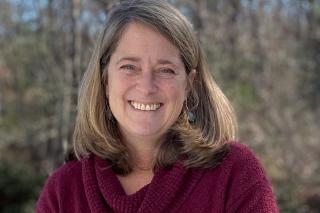What inspired you to research early childhood mental health?
My background is in clinical psychology, and before I came to Simmons I was a practicing clinician, working with young children and their families. I was struck by how many of these young kids who were presenting with aggressive and disruptive behaviors had underlying challenges identifying and verbalizing their emotions. I also saw how these families were impacted by the significant behavioral and emotional challenges of the children, and how parents were often struggling with their own mental health challenges.
Once I shifted to teaching at Simmons, I wanted to continue to focus my research on the role of emotions in early childhood mental health. Most of my research is part of a collaborative effort with Bradley Hospital in Rhode Island and focuses on how to understand and treat very little kids who are struggling with their emotions.
What have you found to link early difficulties in processing emotions to the development of child mental health problems?
We have found that young children's ability to understand and label emotions is key to being able to regulate their behavior. Kids who misidentify emotions have more behavioral difficulty, they get stuck in their negative emotions, and lack the capacity to cope with strong feelings. We also found that kids with parents who reported a history of depression often over-identify sadness — these kids seem to assume that something is sad, even when it's more benign or neutral. We've also started to look at young children who struggle with other kinds of difficult emotions and thoughts, such as irritability and suicidal thinking.
How is the COVID-19 pandemic impacting your research?
The changes to hospital rules and restrictions have caused somes delays and disruptions to our research. Also, how do we study emotions when we're all wearing masks? We've had to wrestle with all of those challenges, and it has forced us to do things differently.
On the flipside, there are some interesting opportunities that have come about. I'm working with Professor Gregory Feldman and Assistant Professor Elizabeth Donovan on a longitudinal study looking at how families of preschool-aged children have adjusted to COVID. We recruited families to participate by filling out online questionnaires and asking them to tell us about how they have coped with the emotional challenges of the past two years.
We're still analyzing the data, but so far, we've seen a lot of variability in how families have fared emotionally over the course of the pandemic — some have responded with remarkable resiliency and others have really struggled. We collected two waves of data in March 2020 and March 2021, and plan to do another in March 2022, to try to understand these different emotional patterns in the context of a prolonged serious stressor.
We're also finding so far that parent mental health and well being is important — when parents are struggling, kids are struggling. We're finding that parents who are less emotionally flexible experienced increasing distress during the first year of the pandemic. Not surprisingly, many parents identified school closures as a major family stressor.
Any advice for parents struggling to teach young children how to process and express their emotions?
Parental well-being and mental health is really important. Parents need their own emotional support and self care to be in the best position to help their child. Especially with preschool kids, it's also important for parents to remember that even typically developing children are not well regulated all the time! There are a lot of transitions taking place and a lot of skills they are trying to master. Parents can help by staying emotionally present when their child is struggling with big feelings and by validating and labeling those feelings — this helps kids to find the words to communicate their emotional experiences and needs. These are also opportunities for parents to partner with their child in learning strategies for managing emotions and problem-solving, not just fixing the problem for them.
Do you have advice for Simmons students interested in studying childhood mental health?
Simmons offers a lot of relevant courses in Psychology — Developmental Psychology, Psychology of Adolescence, Child Psychopathology, Research in Child Development — as well as in related disciplines such as Sociology, Education, and Social Work. Get experience working with kids and get exposure to a wide range of development — volunteer in schools or community programs, or be a camp counselor over the summer. Also, get involved in research with faculty, or off campus at one of the many hospitals in the area. Even if you want to work clinically with kids (for example, as a therapist), research in child development lays the groundwork.

